Behavioral Food Therapy: Signs We Should Work Together
A note to my readers: If you're considering getting support on your food journey, the purpose of this article is to explain who benefits from Behavioral Food Therapy, common signs of distress to look out for, and what to expect when partnering with me.
As a Behavioral Food Therapist, there are a variety of reasons clients choose to partner with me on their healing journey. While they might initially be attracted to the idea of "perfecting" their diet, deep down they know the solution to their mindless eating habits, weight concerns, food anxiety, low energy, or self-doubt is multi-faceted. They might not be able to articulate it at first, but their gut instinct tells them it's not just "what" they eat that deserves attention, but also "how" they interact with food and with themSELVES.
This is where I meet them: at the intersection of food, emotions, and their connection with self. They're looking for somebody to bridge their experience at the doctor's office with their experience in a psychotherapy session; somebody who can make space for the whole person and integrate physical nutrition, mental nutrition and spiritual nutrition. [Full disclosure: 70% of time and attention in and out of session is devoted to mental and emotional transformation. As we embed ourselves in the work of healing our relationship with food and body, we realize food isn't the real problem. It's just a symptom, the tip of the iceberg. The base of the iceberg - the real work - begins with getting to know ourselves and learning how to recognize and navigate thoughts and emotions that trigger unwanted food and lifestyle choices.]
So we begin our work. We explore their history of experiences with food and their body. We give a voice to the stories, beliefs, and mindsets that have developed as a result of those experiences. We identify and dismantle the patterns and mental and emotional barriers keeping them stuck. And we discover healthier ways to care for their whole being so they can step into a fuller, more vibrant expression of themselves and connect with the world around them in a meaningful way.
But at the beginning, when you're stuck, you cannot see this path forward. You just know something's not working, that things don't feel aligned in your body, in your heart, in your spirit. You might notice one or two breadcrumbs as clues, signs of distress. And it's paying attention to these breadcrumbs - picking them up and asking for help to hold them and follow their trail - that will lead you back to you.
Listed below are some of the most common breadcrumbs my clients have picked up and brought in to me. This is not an exhaustive list. But if you identify with any of these signs, hopefully it serves as a reminder that you're not alone in what you're experiencing and sparks hope and motivation for getting to a better place.
FOOD MINDSET
Experience food guilt or food anxiety
Approach food with an all-or-nothing or perfectionist mindset
Participate in “cheat” days
Don't enjoy food
Feel overwhelmed and confused about what to eat and what not to eat
EMOTIONAL CARE
Eat compulsively to numb, distract, or self-soothe
Eat too fast or too much food, out of habit, and feel uncomfortably full
Skip meals or wait too long to eat
Struggle to discern emotional needs from physical needs
Use food and/or exercise to gain a sense of control when other parts of life feel out of control
Recognize food is your primary coping mechanism
Desire to learn non-food coping mechanisms to better manage uncomfortable emotions
Sense a misalignment and tension between who you know you can be and how you're currently living.
CONNECTION TO SELF
Feel ambiguous or confused about how different foods feel in your body
Measure self-worth by the number on the scale, how well you follow a food or exercise plan, or compliments based on physical appearance
Lack awareness of, ignore, or suppress hunger signals
Lack body trust
Concerned with body image
Hear the critical or judgmental voice of a parent, partner or doctor when you look at yourself in the mirror or work towards a goal.
Struggle to set healthy boundaries, articulate or prioritize your needs over others'
Sense a discontent or subtle uneasiness in yourself, despite good health and a balanced eating style
If you identify with any of these signs and you’d like one-on-on support, get in touch for a
free 30-minute consultation.











